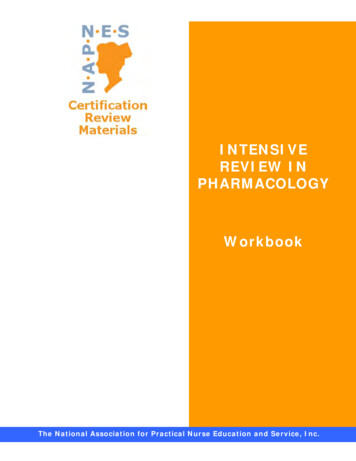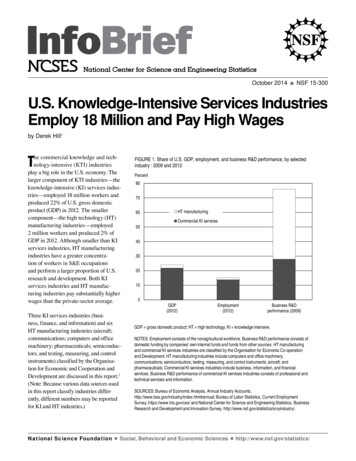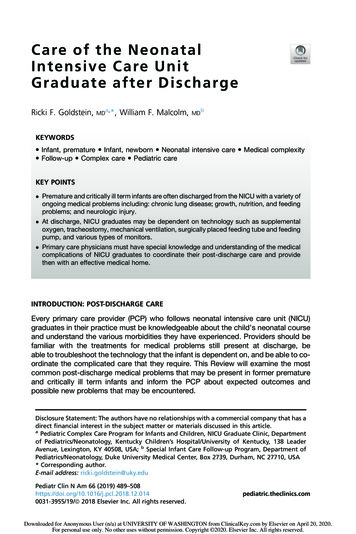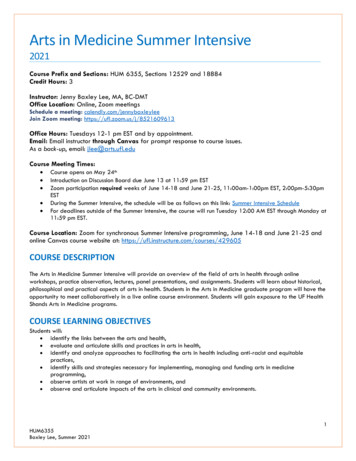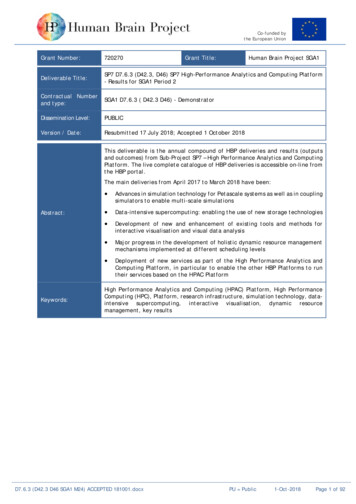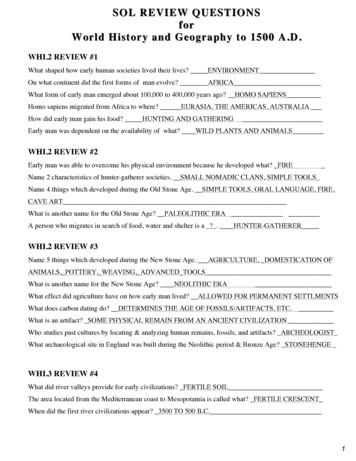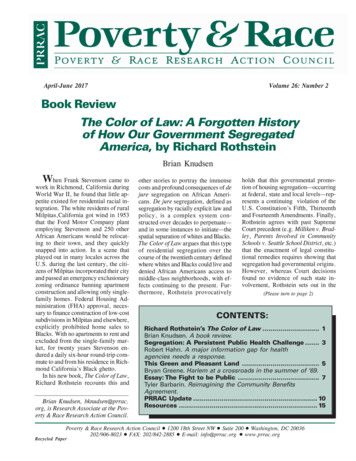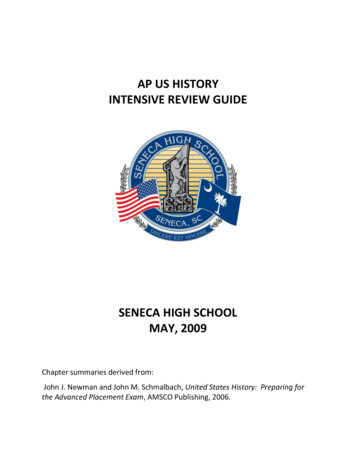
Transcription
AP US HISTORYINTENSIVE REVIEW GUIDESENECA HIGH SCHOOLMAY, 2009Chapter summaries derived from:John J. Newman and John M. Schmalbach, United States History: Preparing forthe Advanced Placement Exam, AMSCO Publishing, 2006.
2Table of ContentsAPUSH REVIEW SHEET #1: . 3APUSH REVIEW SHEET #2: . 5APUSH REVIEW SHEET #3: . 7APUSH REVIEW SHEET #4: . 8RECURRING TOPICS:. 9Exploration, Discovery, and Settlement, 1492-1700 . 10The Thirteen Colonies and the British Empire, 1607-1750 . 12Colonial Society in the Eighteenth Century . 14Imperial Wars and Colonial Protest, 1754-1774 . 16The American Revolution and Confederation, 1774-1787 . 18The Constitution and the New Republic, 1787-1800 . 21The Age of Jefferson, 1800-1816 . 24Nationalism . 27Sectionalism . 28The Age of Jackson, 1824-1844. 30Society, Culture, and Reform, 1820-1860 . 32Territorial and Economic Expansion, 1830-1860 . 34The Union in Peril, 1848-1861 . 36The Civil War, 1861-1865 . 38Reconstruction, 1863-1877. 40The Last West and the New South, 1865-1900 . 42The Rise of Industrial America, 1865-1900 . 44The Growth of Cities and American Culture, 1865-1900 . 46National Politics in the Gilded Age, 1877-1900 . 48Foreign Policy, 1865-1914. 50The Progressive Era, 1901-1918 . 51World War I, 1914-1918 . 55A New Era: The 1920s . 58The Great Depression and the New Deal, 1929-1939 . 60AMSCO CHAPTER SUMMARY #25: . 62Truman and the Cold War, 1945-1952 . 63The Eisenhower Years, 1952-1960. 65Promises and Turmoil: The 1960s . 67Limits of a Superpower, 1969-1980 . 69The Conservative Resurgence, 1980-. 72
3APUSH REVIEW SHEET #1:“Historic” Presidential ElectionsThe 2008 presidential election has often been referred to as “historic,” but as we prepare forthe AP US History exam, let’s remember some others:1800T. Jefferson (R) defeats J. Adams (F)“Revolution of 1800”The first peaceful transfer of power in the modern world from one ruling party to another1820J. Monroe (R) – UnopposedDemise of Federalist Party after War of 1812“Era of Good Feeling”1824J.Q. Adams (R) defeats Jackson (R), Clay (R), and Crawford (R)“Favorite Sons” of the Northeast, West, and SouthJackson loses to Adams in the House of Representatives although he had received more votes thanAdams in the electionJohn C. Calhoun unopposed for VP“Corrupt Bargain”1828Jackson (Democratic Republican) defeats J.Q. Adams (National Republican)John C. Calhoun re-elected as VP after aligning with the JacksoniansNational Republicans become known as “Whigs,” opposing “King Andrew”Democratic Republicans shorten their name to “Democrats”1860Lincoln (Republican) defeats Breckinridge (Southern Democratic), Bell(Constitutional Union), and Stephen A. Douglas (Northern Democratic)Civil War pretty historicAlso the first presidential victory for the Republican Party, which was formed in 18541876Rutherford B. Hayes (R) defeats Samuel J. Tilden (D)Votes from Florida, Louisiana, and South Carolina disputed“Compromise of 1877” ends Reconstruction in the South – Hayes agrees to remove troops for votesNOTE: This was the same election in which Wade Hampton ran for governor of South Carolina.
41932FDR (D) defeats Herbert Hoover (R)Result: The New Deal. Call it what you will.1948Harry S Truman (D) defeats Thomas Dewey (R)*** Third Party: Strom Thurmond (“Dixiecrat”)“Segregation: Take One!”Truman an underdog – outhustles Dewey, who had grown overconfidentSouthern Democrats challenged Truman due to his support of civil rights (integrated military)1964LBJ (D) defeats Barry Goldwater (R)Goldwater’s conservative wing had taken control of the convention – LBJ’s campaign portrayedGoldwater as an extremist with the “Daisy Ad”SOUTHERN REALIGNMENT: Aside from his home state of Arizona, all of Goldwater’s electoral votescame from former Confederate states.1968Richard Nixon (R) defeats Hubert Humphrey (D)*** Third Party: George Wallace (American Independent)“Segregation: Take Two!” [Twenty Years Later – Easy to Remember]SOUTHERN REALIGNMENT (Continued): Of the former Confederate states, five (5) voted for Nixon, five(5) for Wallace, and one (1) for Humphrey. The Democratic Party would no longer be able to take the“Solid South” for granted.1980Ronald Reagan (R) defeats Jimmy Carter (D)This election is the first triumph of the modern conservative movement in a presidential election(Reagan had supported Goldwater in 1964)
5APUSH REVIEW SHEET #2:Landmark Supreme Court CasesMarbury v. Madison(1803)Marbury v. Madison is pretty much the OG of landmark Supreme Court cases. Inthis decision, Chief Justice John Marshall claimed for the Court the power ofjudicial review.McCulloch v. Maryland(1819)YES Congress does have the power to establish a national bank (necessary andproper, anyone?)NO Maryland does not have the power to tax a branch of the Bank of the UnitedStates that is located inside its borders. “The power to tax involves the power todestroy.” Maryland can’t use taxation to undermine the BUS.Dred Scott v. Sandford(1857)“A case which will live in infamy ” FDR didn’t really say this, but it would be coolif he had. 1) Blacks cannot be citizens of the United States (although some freeblacks had exercised rights of citizenship in some states at the time that theConstitution was drafted) and 2) Congress cannot restrict slavery in the territories,as to do so would undermine property rights.This decision was effectively nullified by the Fourteenth Amendment.
6Plessy v. Ferguson(1896)The “separate but equal” decision. The Supreme Court upheld a Louisiana lawthat required boxcars to be segregated by race. The Court held that states maysegregate races as long as the segregated facilities are of equal quality (as if thiswas ever the case).Schechter v. United States(1935)This case is otherwise known as the “Sick Chicken Case.” The Schechter Bros.Poultry Corp. sued the federal government after FDR’s National RecoveryAdministration (NRA) made it impossible for the Schechters to do business.The Court ruled the NRA unconstitutional, as it granted too much power to theexecutive branch over the economy.Korematsu v. United States(1944)Fred Korematsu challenged the federal government’s power to inter JapaneseAmericans living on the West Coast during World War II. The Court ruled thatJapanese internment was justified by the war effort.Brown v. Board of Education of Topeka(1954)Evidently, separate is not equal, after all. The Court overturned Plessy v. Fergusonand ruled that the Board of Education of Topeka, Kansas, would have to integrateits schools.Miranda v. Arizona(1966)“You have the right to remain silent. Anything you say can and will be used against you in acourt of law. You have the right to an attorney ”A person accused of a crime has the right to be informed of his or her rights priorto being interrogated by law enforcement.
7APUSH REVIEW SHEET #3:Immigration and Internal MigrationsInteresting Nativist Cartoons: migrationInternal MigrationCOLONIAL PERIODPre-1790Predominantly from the British Isles(England, Scotland, Ulster), withsome from GermanyHundreds of thousands of slavesimported from AfricaANTEBELLUM PERIODIrish Potato Famine(1845-1849)1849 Gold RushOver 700,000 Irish (Catholic)Immigrants spark nativist sentimentThe demand for labor led to ChineseimmigrationThousands of U.S.citizens move west“NEW IMMIGRATION”1880-19241882“New” immigrants from eastern andsouthern Europe (as opposed to “old”immigrants from western Europe)were predominantly Catholic andJewish. This irked a number of nativeProtestants.The Chinese Exclusion Act forbadefurther immigration from China andforbade Chinese from beingnaturalized.TWENTIETH CENTURY19241915-1930The Immigration Act of 1924restricted immigration from eachforeign country to 2% of the numberof persons living in the United Statesin 1890 (preference for WesternEuropeans/Protestants)The “Great Migration” ofAfrican-Americans from theSouth to other parts of the U.S.
8APUSH REVIEW SHEET #4:Significant Rebellions in U.S. HistoryDisgruntled White RebellionsSlave RebellionsCOLONIALBacon’s Rebellion (VA)Stono Rebellion (SC)http://en.wikipedia.org/wiki/Bacon%27s Rebellionhttp://en.wikipedia.org/wiki/Stono rebellionThe American Revolution (Started in MA)http://en.wikipedia.org/wiki/American revolutionEARLY NATIONAL PERIODShay’s Rebellion (MA)http://en.wikipedia.org/wiki/Shay%27s RebellionHaitian Revolution (Haiti)http://en.wikipedia.org/wiki/Haitian RevolutionWhiskey Rebellion (PA)http://en.wikipedia.org/wiki/Whiskey rebellionHartford Convention (CT)http://en.wikipedia.org/wiki/Hartford conventionANTEBELLUM PERIODNullification Crisis (SC)http://en.wikipedia.org/wiki/Nullification crisisNat Turner’s Rebellion (VA)http://en.wikipedia.org/wiki/Nat Turner%27s slave rebellionJohn Brown’s Raid (VA)http://en.wikipedia.org/wiki/John Brown%27s RaidSecession (Started in SC)http://en.wikipedia.org/wiki/Confederate States of AmericaADDENDUM:RIGHTS MOVEMENTSAntebellum PeriodAbolitionismLate 19th CenturyLabor MovementPopulist Movement20th CenturyWomen’s Suffrage Movement, Civil Rights Movement, Vietnam War Protests, Women’s Rights Movement
9RECURRING TOPICS:All of the items below have appeared on multiple released exams.Proclamation Line of 1763The Stamp ActBattle of Saratoga as a turning pointThe Status of Women in Early National America“Republican Motherhood”Hamilton’s Economic PoliciesLouisiana PurchaseMarbury v. MadisonRepublicanismMissouri CompromiseAmerican Colonization SocietyCompromise of 1850Popular SovereigntyPercentage of Slaveholders in the antebellumSouthNorthern attitudes toward blacks in theantebellum periodCauses of the Civil War (Northern and Southernperspectives)Social DarwinismDawes ActOpen Door PolicyLate 19th century: Jacob RiisPlessy v. FergusonImperialism in the PhilippinesProgressive Era LegislationWorld War I PropagandaTreaty of Versailles / Fourteen PointsWoman Suffrage by StateMarcus Garvey (Back to Africa Movement)Bonus ArmyGreat Depression: Hoover vs. FDRJapanese Internment Camps – WWIIKorematsu v. United StatesBrown v. BoardSurvey of Indian PolicyImmigration Patterns and LegislationGulf of Tonkin ResolutionLBJ’s Great Society/Vietnam War DilemmaTet Offensive
Exploration, Discovery, and Settlement, 1492-1700AMSCO Cha
APUSH REVIEW SHEET #2: Landmark Supreme Court Cases Marbury v. Madison (1803) Marbury v. Madison is pretty much the OG of landmark Supreme Court cases. In this decision, Chief Justice John Marshall claimed for the Court the power of judicial review. McCulloch v. Maryland (1819)

